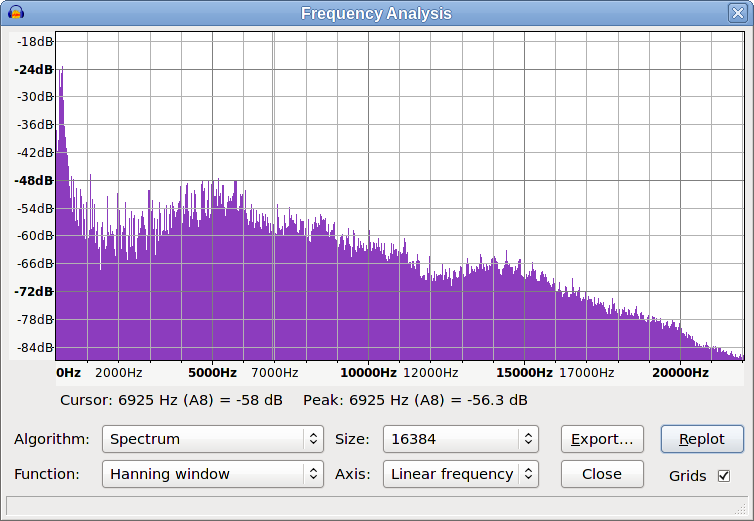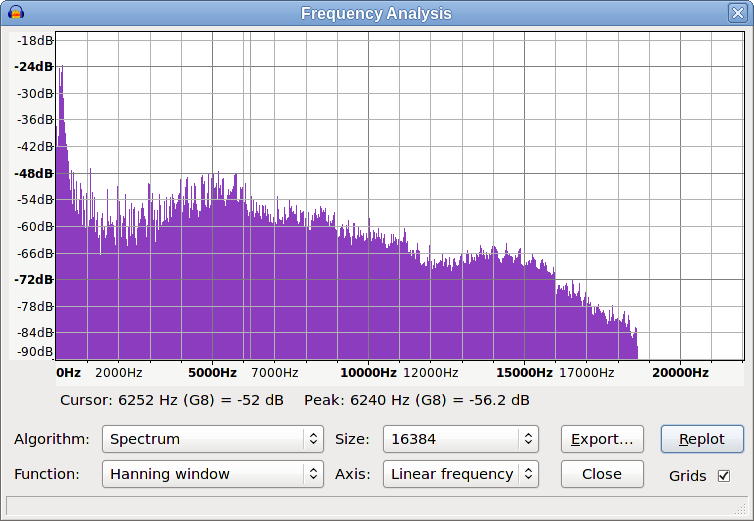Is there a way (using audacity) to test if a .wav file was ever an mp3?
TIA
Is there a way (using audacity) to test if a .wav file was ever an mp3?
TIA
Given that MP3 works on psycho-acoustical phenomena, not electrical, I’m going with no. You can obviously tell if somebody overdid it and the show is bubbling and honky, but if they did a good job in encoding and used a high enough bitrate, you should not be able to tell. The only other way to tell would be if the MP3 encoding left artifacts behind in the WAV header, but Audacity is a supremely bad tool for getting INFO.
Koz
There are some tools that TRY to do that, but without the original uncompressed data there’s no way to know for sure if there’s a difference between the original and the copy you have. [u]Tau Analyzer[/u] is one such tool.
Of course, if you buy the CD (or download a FLAC) from a legitimate source you are getting the best possible quality and if it’s a CD (or FLAC) from a “big” record company it’s very unlikely that it was produced from MP3s. If you download illegally from torrent sites, you often get what you pay…
I have seen an option on a program i have “somewhere” that purports to be able to tell. I don’t remember where. I was looking around audacity to see if that was it. there is anj option in traders little helper that says “test wave files for mpeg”. the file i’m concerned with returns " track looks like CDDA with probability 92%.". I’m not sure what that means… ![]()
![]()
If there are frequencies above 20kHz present in the file then it is likely that it has never been compressed.
The very highest quality MP3s (320 kbps) are limited to a maximum frequency of 20 kHz.
Lower quality MP3s are generally limited with a lower cut-off.


You can also use the “Spectrogram”-view; zoom out to look at the range between 15khz and 20khz. A mp3 will have holes when the high frequency content is masked by lower frequency content. Here’s an example (original wav, 320kbps mp3, 160kbps mp3):

I don’t understand. What is the purpose of finding this out? It’s not like you can somehow revert it into .wav again, what you get is what you get.
As for the replies above, the methods can tell whether the a file labelled as .mp3 contains a lossy-compressed audio, they do not tell whether the .mp3 was compressed from a .wav source (which is what I understand the TS to be asking).
Unless there is some tag/header information that specifies the source, I’m gonna go with “no”.
I too was wondering that.
Yes. As I wrote in my reply "If there are frequencies above 20kHz present in the file then it is likely that it has never been compressed.". Other lossy compression formats are likely to have similar characteristics to MP3.
Nice ![]()
the purpose is to try to see if a file i have on a CD was converted to a .wav from an MP3 before I burned it to disk - it’s been over a decade since i burned the disk and years of free thinking has rendered some memories incomplete. I have a CD of a very rare performance of a band calling themselves “Acoustic Allstars” (Tony Rice, Sam Bush, Bela Fleck, Mark Schatz, and Tim O’Brien) performing at Red Rocks Amphitheater in 1999. This is an audience recording and is pretty high quality - i’m thinking about building a torrent and sharing. Some folks are very particular about the source of their recordings. I agree that what you have is what you have…in my opinion, fretting about the provenance of the recording is about as useful as fretting about what my motivation was in gathering the info, pilgrim…
“Test if .wav file was ever an mp3”
The word “test” implies a computer-based test - run some audio through a program, and get back a Yes or a No. I don’t think that’s possible (yet), but I’m willing to be proven wrong.
Meanwhile, though, there’s a pair of web pages on the topic which are quite instructive:
Detecting MP3-Sourced and Mini-Disc Audio (Frequency Analysis)
Detecting MP3-Sourced and Mini-Disc Audio - Part 2: Spectral Analysis
These date from 2002 (!), and I think they come from the folks who like to record live shows by musical performers, then produce and distribute recordings without the assistance of the artists or their record companies. (Back in my day, we called these “b00tleggers”) The good news is, these people are actually advancing the state of the art, and requiring high-quality lossless recordings. Check out The Trader’s Den.
“These date from 2002 (!), and I think they come from the folks who like to record live shows by musical performers, then produce and distribute recordings without the assistance of the artists or their record companies. (Back in my day, we called these “b00tleggers”) The good news is, these people are actually advancing the state of the art, and requiring high-quality lossless recordings. Check out The Trader’s Den.”
you seem to imply less than honorable intent by all folks who trade live performance music (i’ve had an account at Traders Den since 2008). There are a large number of folks, such as myself, who do not participate in the trading of copyrighted material and only trade live performances from artists who expressly allow such activities. in fact, this practice is encouraged by some artists. Part of the culture of this group forbids the selling or profiting from this activity…as it should be. There are also artists who forbid this activity ( Peter Rowan, Jorma, etc )and generally those wishes are honored - again, as they should be. There are torrent trackers where these rules are law and are honorable (dimeadozen, lossless legs) and others who could care less (pirates bay). this is an area where the bad actions of some diminish the reputation of all. Don’t use such a broad brush when painting music traders.
let me add this tidbit…
in the past when preparing a torrent for sharing, i have taken samples from a .wav file and converted to mp3 to post along with the torrent for folks to judge the general quality of a recording - a tool to assist in their decision to downloiad/not download. when i listen to the mp3 side by side with the .wav segment, my ears can tell the difference. and, of course, comparing the wave forms side by side (in audacity, of course) my eyes can easily see the difference.
![]()
![]()
Exactly! I have the same problem and in the past I bought some hard to find music from a broadcaster and was having the same doubt. The sound is not the same as a modern cd, but this could be because of the old music and sources used in the original recording… so que question rose if they were truly original. This is a good forum!